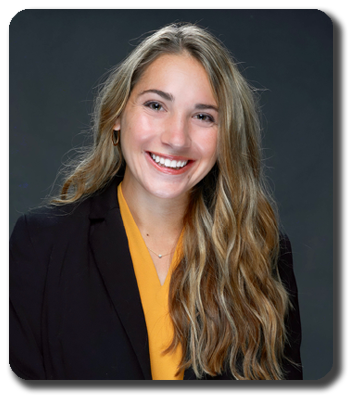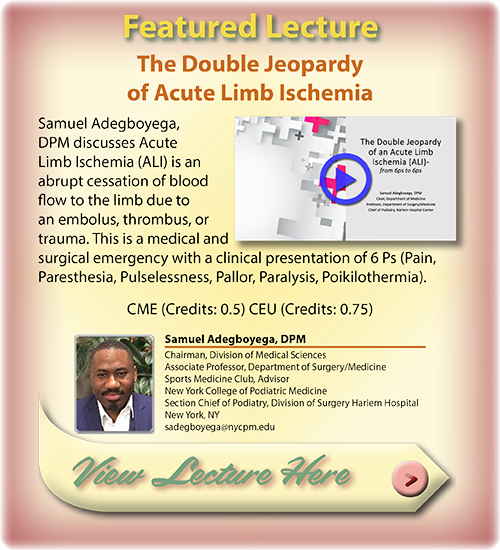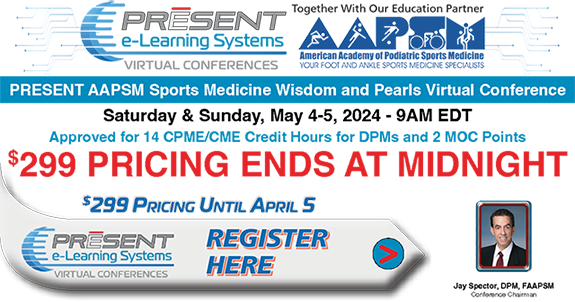
Welcome to the First Edition of Sole Purpose!
We're thrilled to welcome Savannah Santiago (almost DPM) to the PRESENT Team! She is set to graduate from Western University of Health Sciences this May, just a whisker under two months away. Savannah will soon be a resident at St Vincent in Indianapolis and is eager to soak up three years of knowledge under the wing of residency director Dr Patrick DeHeer. Via her new PRESENT blog, Sole Purpose, she is set to dish out regular doses of podiatric wisdom, share her experiences as a woman navigating the medical field, and explore her unique perspective on diabetes care. Plus, with a marathon on the horizon, she'll touch on juggling work, life, fitness, and effective time management.
Savannah's content promises a blend of humor, relatability, and personal anecdotes. Her firsthand experiences managing diabetes and sports injuries give her a special rapport with patients. Expect her to reflect on staying sane in medicine, sprinkle in some sports stories, and emphasize the crucial role of empathy and communication in patient care. We at PRESENT cannot wait to see how her writing content evolves as she continues to grow in her career!
So here is Sole Purpose by Savannah Santiago, Issue #1. Expect issues weekly on Fridays on the website at 6PM, in your Inbox at 9PM:


Issue 1 - April 5, 2024

Doctor of Podiatric Medicine Candidate 2024
Sole Purpose 1
Lessons Learned From My First Time in the Operating Room
Lessons Learned From My First Time in the Operating Room

As graduation looms closer, I've been reflecting on the significant growth I've experienced over the past four years, particularly in overcoming my awkwardness in the operating room (OR). During my fourth year, I've spent most days of the week in the OR, and I've also had numerous opportunities during my third-year clinical rotations. Despite this extensive exposure, I still find myself occasionally feeling like a novice. Here are some valuable tips that have aided me in navigating these experiences:
- Preparation is Key - Spend some time the night before familiarizing yourself with the surgery. While you shouldn't sacrifice sleep, investing an easy 15 minutes in reading resources like OrthoBullets, McGlamry, Coughlin or relevant articles can significantly enhance your confidence and ability to answer pimp questions correctly. Do not only sleep 2 hours the night before surgery to prepare… you need sleep. Balance is important.
- Introduce Yourself to the Scrub Tech and Nurses - When entering the OR, introduce yourself to the scrub tech. Mention whether you have prior scrubbing experience and ask if it's acceptable for you to assist with tasks like grabbing things from the mayo stand when they're occupied. Direct communication is always appreciated.
- Familiarize Yourself with Room Setup - Learn how to set up an OR. Different places may have varying protocols, but basic tasks like glove and gown retrieval, assisting with patient preparation, rolling a towel for a bump, grabbing a tourniquet, preparing local anesthesia, and tying gowns are easy ways to contribute. I also always help with room turn over - I am in no way too good to grab a mop/wipe and help! I want to get the next case started too (some places do not want your help with this and that is A-OK! It’s a good time to eat your protein bar). Be helpful but do not be weird.
- Calm Yourself With a Deep Breath - Before scrubbing in, take a deep breath to ground yourself. The OR can be chaotic, especially for students, and this practice helps you enter the room with a sense of calm and readiness, reducing the likelihood of mistakes. It has made a huge difference for me! I do the same thing before I walk into a patient room in clinic.

- Pay Attention and Anticipate - Always be prepared for the next step, have a lap or the bovie ready, ask for scissors when the resident is suturing. While it's important to anticipate what's needed, avoid overstepping your role. As a third or fourth-year student, you won't be the one performing complex skin to skin procedures, so stay within your boundaries. Do not take things out of people’s hands.
- Be Aware of Your Surroundings and Read the Room - Is the mini-C arm draped and right before you? Be careful to not step back and contaminate it. Is the K wire sharp and not capped? Be careful to not touch it or stab someone else when moving the foot. If the surgeon is frustrated because the case isn’t going as expected or there is a complication, it is not time to ask what their favorite color is or where they went to residency.
- HAVE SNACKS - Bring snacks with you. Days in the OR can be long, and proper nourishment is crucial. I have passed out in the OR because I didn’t eat all day. It is SUPER embarrassing but it happens. Do not be like me. Have a protein bar or something on you or in the locker room. I like to eat approx every 4-6 hours. Nobody will ever make a comment about you stepping out between cases to eat a protein bar that is on you or nearby.
- Learn Basic Suturing - Proficiency in hand-tying and basic suturing is a simple way to demonstrate your preparedness and hand skills. I tied a string to my steering wheel for when I was sitting in bumper to bumper LA traffic. Since this may not be considered safe, your scrub pant ties are also a great option to practice with.


- Avoid Immediate Studying After Work - After a long day in the OR or clinic, don't immediately dive into studying. Burnout is a real concern. Take 30 minutes to relax, have dinner, watch TV, go for a walk, or engage in activities that help you mentally reset. I have found that I have to work out at least 3x a week (preferably outside). You will find whatever that little thing is that makes you feel better and not like a med school robot.
- Pimp Questions - If you say, “I’m not sure, let me get back to you”, you are promising to get back to someone with an answer. Make sure you follow through. This demonstrates accountability and a commitment to learning.
- Ask Questions - When given the opportunity to ask questions at the end of a case, take it. I like to inquire about the surgeon's preferences or their reasons for choosing one approach over another. I am but a mere student and have far too much to learn to not have a question or two at the end of any case.
- Handle Unpleasant Encounters Professionally - Unfortunately, some individuals in the OR may exhibit unfriendly/mean/downright rude behavior. It can be challenging but try not to take it personally. Maintain your professionalism and focus on your role as a guest in the OR. People can be VERY particular in the OR. Roll with the punches and try to not get worked up. It sucks but the more you work with that individual, the more accustomed you become to their quirks. Granted, some behavior is not acceptable. Know when you need to escalate the situation to someone above you.


- Don't Hesitate to Seek Guidance - Be open to learning from others. Different people have various techniques and approaches. Ask for help when needed and remember the importance of timing and assessing who is willing to provide assistance. I asked a resident today if she could show me her technique for gathering because I had never seen it before, and she showed me and it was awesome. People notice when you want to learn and that you are paying attention!
- Acknowledge Your Learning Stage - Remember that you are at the beginning of your medical journey, and making mistakes is part of the learning process. Everyone makes errors, but it's essential to take ownership of them and avoid repeating them. Carelessness is very different than an honest mistake. Lord knows I have dropped instruments, cut sutures too long and too short, grabbed the wrong gloves, contaminated things. OWN your mistakes. But please try to not repeat them.
- Treat Yo’ Self - After a particularly grueling day in the OR or a challenging call week, give yourself a well-deserved treat. Take a break from studying or school-related thoughts, enjoy your favorite food, and reset your mind. The medical journey is long, and self-care is essential. My favorite post long OR day food is McDonalds. It’s terrible and I love it.
- Embrace Every Experience - Regardless of the day or the complexity of the surgery, there's always something to learn. Approach each situation with an open mind and a commitment to growth. It can be challenging. I have had plenty of times where I have felt tired or grumpy while retracting through my 3rd I&D of the day. Remember that each day brings you one step closer to becoming the physician you aspire to be. HOW COOL IS THAT? Attitude is everything.
There are countless other things, but these 16 points have had a significant impact on my experience. Always keep in mind the progress you've made and don't be too hard on yourself. Mistakes are a part of growth, and all you can do is give your best effort.





























Comments
There are 0 comments for this article